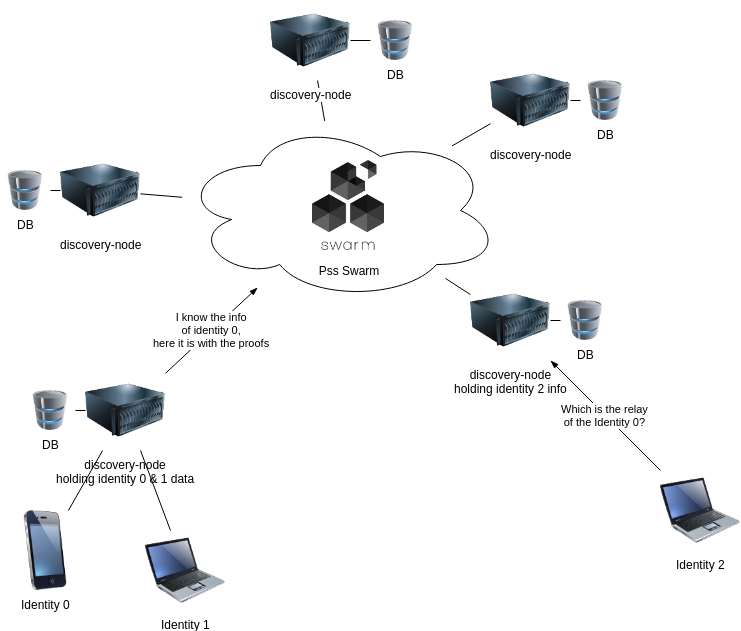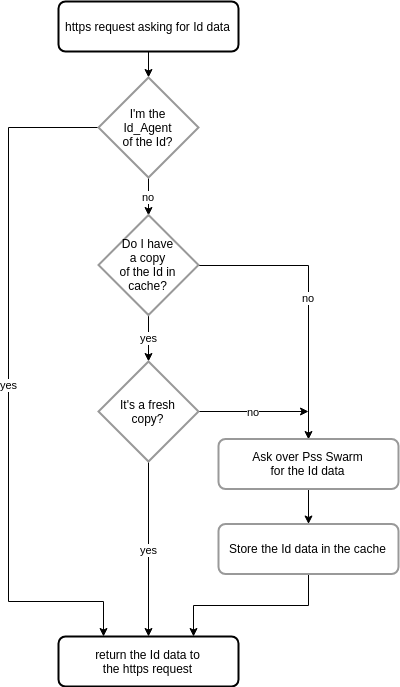Overview¶
discovery-node Go Report Card GoDoc¶
Draft implementation of discovery-node of the decentralized
discovery protocol over Pss Swarm
Overview¶

network00
Types of node: - gateway (passive): are the nodes that only
perform petitions, acting as gateways to the discovery network. This
node can be trustless, as all the data that gets from the network and
that is returned to its petitions, have the proofs of validity
(merkleproofs) - active: are the nodes that are answering requests,
each identity trusts its active discovery-node
Node Storage¶
The discovery-node data storage is a leveldb database. It’s
organized with prefixes, where each type of data is stored under a
prefix.
Databases: - dbOwnIds: holds the data about the identities that the
discovery-node manages - dbAnswCache: holds the data about the
discovered identites. Each data packet of a discovered identity, has a
timestamp, the data packets are valid under a time window where the
timestamp allows to determine if it’s already valed or is too old
Sample discovery flow¶
Roles: - user: user identity, from a phone/laptop device -
Requester: discovery-node that wants to know about one identity
- Id_Agent: discovery-node that knows the info about the
identity, and is listening in Swarm Pss in the topic
id_discovery
Flow when a discovery-node receives an Id discover request:

flow00
Discovery flow:
discovery-nodereceives an https petition from theuserasking for an identity info, from now, thisdiscovery-nodewill be theRequesterRequesterchecks if already knows a fresh copy of the data packet of the identity- in case that has the data, checks that the
timestampis not too old - if the data is fresh, returns it and finishes the process
- if the identity data was not in its databases, ask to the network for it (following steps)
- in case that has the data, checks that the
RequestercreatesQuerypacket asking for who is the relay of identityjohn@domain.ethRequestersends theQuerypacket into theSwarm Pssnetwork under the topicid_discovery- the
Requesterwaits a configured amount of time, if theAnswerdon’t comes inside that time window, returns an error msg through https to theuser
- the
- the
Id_Agentserver of that identity will receive theQuerypacket and will see that is a user under its umbrella Id_Agentserver will answer theAnswerpacket (with the proofs of validity, signature, etc) to theRequesterRequesterreceives theAnswerpacket (verifies the signature), and now knows how to reach the Relay node ofjohn@domain.eth, and can answer to theuser
Requester Id_Agent
+ +
| |
* 1 |
* 2 |
* 3 |
| 4 |
+--------------------------->+
| * 5
| 6 |
+<---------------------------+
* 7 |
| |
+ +
Data structures¶
Each data packet that is sent over the network, goes with a
ProofOfWork, and a Signature of the emmiter.
// Service holds the data about a node service (can be a Relay, a NameServer, a DiscoveryNode, etc)
type Service struct {
IdAddr common.Address
KademliaAddr []byte // Kademlia address
PssPubK PubK // Public Key of the pss node, to receive encrypted data packets
Url string
Type string // TODO define type specification (relay, nameserver, etc)
Mode string // Active or Passive(gateway) (this only affects to discovery-node's type)
ProofService []byte // TODO ProofClaimService data type (to be defined)
}
// Query is the data packet that a node sends to discover data about one identity
type Query struct {
Version string // version of the protocol
MsgId string // random msg id, to identify and relate Query and Answer
AboutId common.Address // About Who is requesting data (about which identity address)
RequesterId common.Address
RequesterKAddr []byte // Kademlia address
RequesterPssPubK PubK // Public Key of the pss node requester, to receive encrypted data packets
InfoFrom []byte // TODO to be defined
Timestamp int64
Nonce uint64 // for the PoW
}
// Answer is the data packet that a node sends when answering to a Query data packet
type Answer struct {
Version string // version of the protocol
MsgId string // random msg id, to identify and relate Query and Answer
AboutId common.Address
FromId common.Address
AgentId Service
Services []Service
Timestamp int64
Signature []byte
}
Run¶
Run one node¶
go run *.go --config config0.yaml start